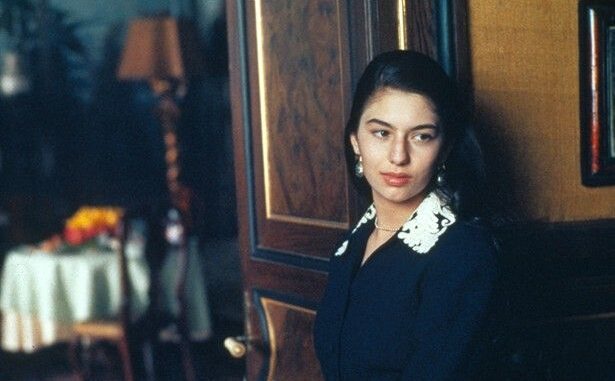
Sofia Coppola emerges from her father’s shadow with Cannes triumph for The Beguiled

Sofia Coppola’s triumphant win at Cannes as best director for The Beguiled is the latest in a series of notable successes for a director quietly but forcefully blazing her own trail as a female director in a film world in which most of the awards, kudos and money still go to men.
With only her second film, Lost in Translation, she won an Oscar in 2004 for best screenplay and, in 2010, she was only the third woman, and the first American woman ever, to win a Golden Lion at the Venice Film Festival, which she was awarded for Somewhere.
But Coppola’s roots in the cinema go back much further than these successes. She first appeared on screen as a baby boy, Michael, at the end of The Godfather (1972), her father, Francis Ford Coppola’s critically acclaimed film based on the novel by Mario Puzo. She is baptised on-screen, in a sacred ceremony marking the importance of birth and continuity of family, both in the story world of The Godfather and in the “real world” of the Coppola family.
Within the complex narrative of The Godfather, the baby she plays unknowingly provides a vital service for her uncle and literal godfather Michael “Don” Corleone, as the baptism provides him with an alibi while his “soldiers” are out murdering the family’s enemies during the ceremony. Of course, in the real world, she also unwittingly provides a service for her father, “performing” for him in the film which would make his career.
Her involuntary transvestite performance nicely sums up the privileges and the difficulties of Coppola’s position in contemporary film culture. On the one hand, she is welcomed, both on and off screen, into a highly influential family, bound not only by ties of blood but also business and loyalty. On the other, she is marked from the very start as being from this family, contained by its meanings and the powerful image her father created as one of the most successful directors of the New Hollywood.
All about my father
It is depressing – but hardly surprising – then, that when interviewed by David Letterman on his show in October 2004, following two Academy Award nominations for Lost in Translation (Coppola was nominated for best director as well as best screenplay), Letterman spent the interview asking her about following in her father’s footsteps, whether he visited her on set, and what advice he gave. Similarly, when interviewed for Italian television by Anna Praderio on the occasion of winning the Golden Lion, Coppola was asked whether she was pleased for her father who recently had been given the Irving Thalberg Memorial Award.
Coppola clearly has benefited from her father’s contacts and especially his production know-how, using his experience to help her stitch up complex co-production deals working alongside her brother, Roman (often but not always with Focus Features). But the persistent interest in her position as the child of a famous director never seems to affect sons in the same way. Just look at Jason Reitman (son of director and producer Ivan Reitman) or Noah Baumbach (son of film critic Jonathan Baumbach).
Sofia’s world
Nor is having a famous movie director as a father a guarantee of the kind of commercial and critical success Sofia Coppola has achieved, as is illustrated by Jennifer Lynch (daughter of David Lynch) and Zoe Cassavetes (daughter of John Cassavetes). What is remarkable is how Coppola has taken the very question of her own privilege – and how it functions as both an enabler and a cage – and explored it across her film worlds.
She places us alongside pampered, privileged daughters – from the adored and luminous Lisbon girls in the Virgin Suicides to the teen queen Marie Antoinette, from a movie star’s charming 11-year-old with her ice-skating lessons and gelato fests in an upscale Milan hotel in Somewhere to the scheming wannabes, home educated by a new-age mother and breaking into celebrity mansions at night, in The Bling Ring. She takes her time to linger on the textures and the delights in these girls’ lives, rather than dismissing them as stupid, trivial or useless.
In a world that refuses to take you seriously – and undermines any attempt you might make to establish yourself as a whole person – the decision to find alternative ways of being seems in contrast eminently sensible. From the hazy meadows and fantasy travel plans of the Lisbon sisters to Marie Antoinette’s fantasy retreat, Le Trianon, Coppola’s films carefully place us into these girls’ fantasy worlds, showing how and why they are necessary.
